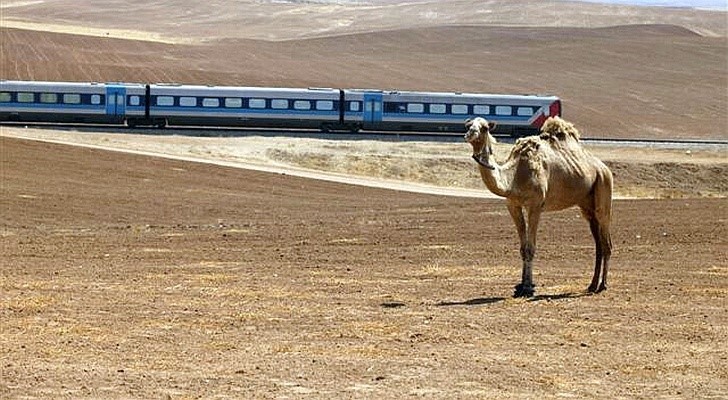The cabinet on last Sunday rejected an appeal by Social and Environmental lobby chairman MK Dov Khenin (Hadash) against the approval of a rail line connecting the country’s center to Eilat. The cabinet first approved plans for the 260-kilometer line, which will stretch from Beersheba to Eilat, on October 6th. Cabinet approval followed authorization by the National Council for Planning and Building in March, after a February decision by the Southern District Committee for Planning and Building approving the final stretch of the rail line from Dimona to Hatzeva. Environmentalists, including ecologists from the Israel Nature and Parks Authority, had particularly opposed that final stretch, claiming that placing the rail line there would be destructive to nature.
Although the train is supposed to be used as a land bridge between Eilat and the Mediterranean Sea, it is expected to make its final stop north of Eilat, the Environment Ministry explained. MK Khenin’s appeal on Sunday was rejected by a majority of the ministers, with 11 voting against and five in favor. Prior to Sunday’s cabinet meeting, Khenin sent a letter to the ministers, urging them to halt planning for the project in order to allow for extensive feasibility testing.
In his letter, Khenin described how extensive research has demonstrated that the rail line would lead to “unprecedented environmental damage in the Negev and Arava and even the extinction of the coral reef in the Gulf of Eilat as a result of mining at the port, which is required for the construction of a land bridge.” The report, submitted to the Knesset Internal Affairs and Environment Committee on October 21, highlighted many additional environmental and financial risks associated with building the line. In addition to describing potential environmental repercussions, Khenin wrote in his letter how a train ticket would likely be so pricey that families may prefer to fly or to drive in private vehicles to Eilat on Route 90. Khenin suggested that the tens of billions of shekels required for the project instead be allocated for education, health, welfare, and the struggle against poverty. A train that passes through the Negev at more than 200 kilometers per hour will not contribute anything to its residents,” Khenin wrote. “The development of such an extensive and expensive project will involve shifting serious resources and will constitute an insufferable economic burden on the Israeli society.”
In support of Khenin’s appeal, students from the Arava Institute for Environmental Studies protested the project’s advancement on Sunday morning, standing in the desert with signs reading “Stop the Train – Save Eilat.” “When the reef will be destroyed, tourism to Eilat will be destroyed with it, no matter how fast tourists can arrive from Tel Aviv,” said Hagar Ben Shlomo, Arava coordinator for Green Course – a nationwide student environmental movement. In order to improve transportation in the area, the Transportation Ministry should direct funds into establishing more public transportation within the Negev, rather than constructing the train, Ben Shlomo argued.



